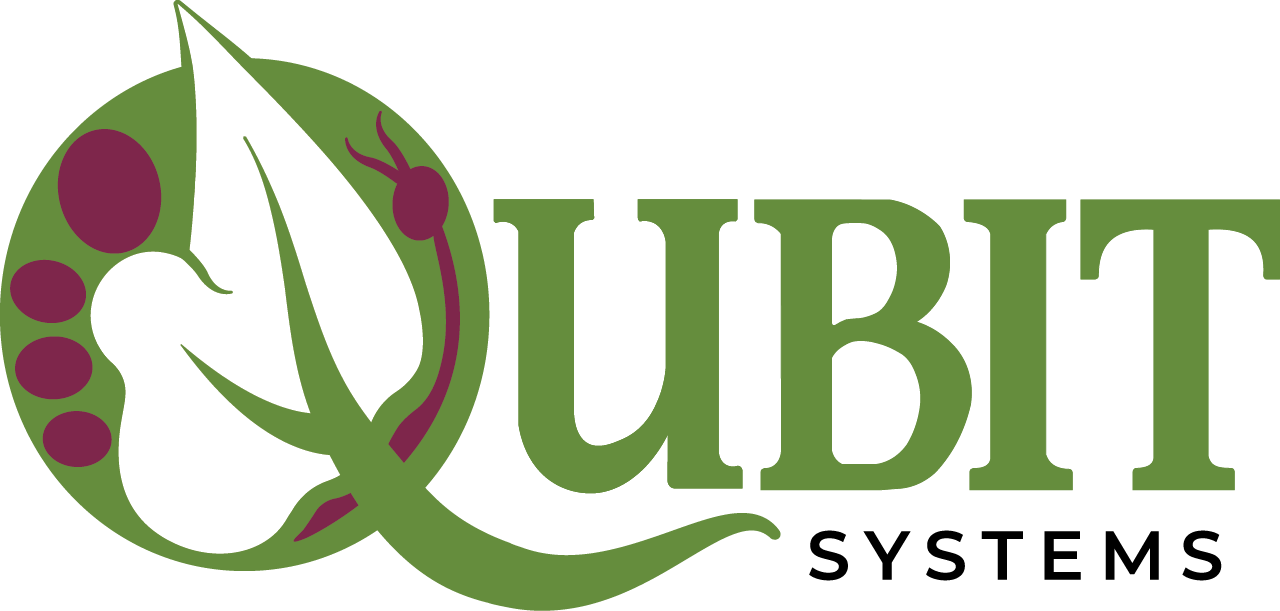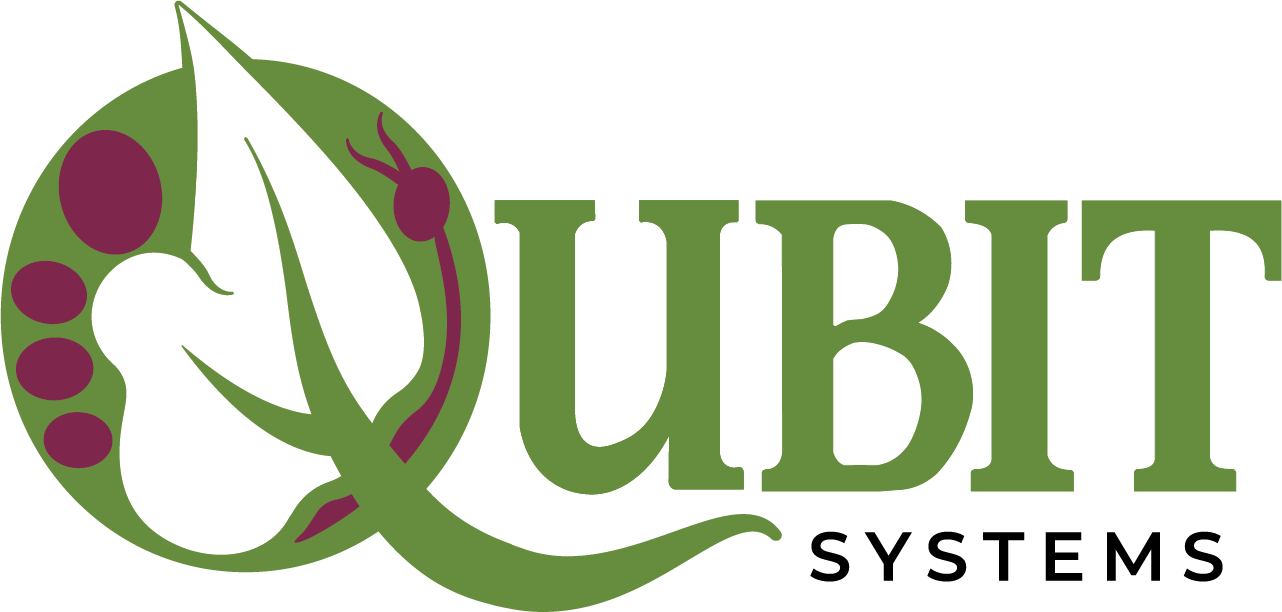
As profs in the teaching lab, we’ve all had that experience – the cerebral student from the University Chess Team complaining that experiments lack intellectual challenge. And if, like me, you are curious about the poor chap’s physiological condition as he vents his frustrated fury, it may occur to you that having the equipment to investigate the energy expended in fits of rage might bring some excitement to the classroom. After all, students of all genders (being, on the whole a competitive bunch) like nothing better than to investigate themselves as experimental subjects, and to boast the magnificence of their physical conditioning (or, strangely, their lack thereof). Thus, the development of Qubit’s new Q-teach Human Respirometry Package…
Dr. Steve Hunt, President and CEO.
Q-teach Human O2/CO2 Package (from $6200 US)
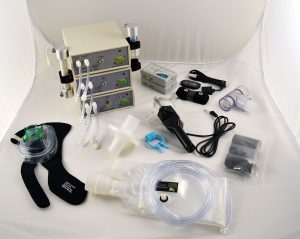
The package is a mixed-expired air respirometry system that incorporates an NDIR CO2 analyzer (0-10% range) and a fuel cell O2 analyzer (0-25% range) to measure the pCO2 and pO2 in exhaled breath. The subject wears a sterilizable face mask with a bacterial filter and a three-way valve, inhaling atmospheric air through a pneumotach spirometer that measures breath flow rate. Exhaled air is collected into a breath collection bag from which a pump samples the breath for analysis. From the pneumotach and gas analysis data, measurements of VO2, VCO2, RER, and breathing rate (breaths per minute) are calculated in our customized LoggerPro software. A heart rate monitor is also included to correlate activity (such as stepping, or work on an ergometer) with heart rate and energy expenditure. The pneumotach can be used independently of the gas analysis system for pulmonary function tests (PFT). The package sells for $6000 USD including all hardware and software. For more information about the Q-teach Human Respirometry Package click HERE.
Electrophysiology Instruments

By the way…
If you are still concerned about the metabolic and emotional state of University Chess Champions, heart waveforms can be monitored using our EKG sensor, the condition of straining trapezius muscles analyzed with our EMG sensor, you can tell them to get a grip with our handheld dynamometer and, using our GSR sensor, calm them with some relaxing biofeedback or use it as a polygraph to determine if the dog really did eat their homework. Each sensor is available for individual purchase, or as a package, and operates with LoggerPro data acquisition and analysis software common to all Qubit equipment. For more information click HERE.
What our clients say:
I’ve loved working with Qubit equipment over the last decade – the instrumentation and the helpfulness of staff are much appreciated. Thanks for all you do.
Jeffrey Schloss, Distinguished Professor of Biology and T.B. Walker Chair of Natural & Behavioral Sciences, Westmont College, Santa Barbara, CA
Q-teach Animal CO2 Package (from $4200 US)
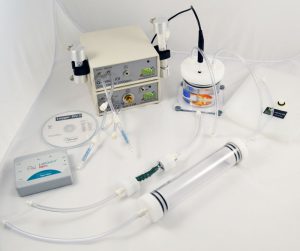
Equipped with Qubit’s teaching NDIR CO2 analyser (range 0 – 2000 ppm), flow monitor, pump, temperature sensor and sample chambers, the Q-teach Animal CO2 Package is used to monitor metabolism and investigate the physiology of insects, lizards and other small animals. LoggerPro software, included with the package, provides graphical display of all data. LoggerPro has numerous built-in mathematical functions for easy and intuitive data processing. Data are saved in spreadsheet format and may be exported to Excel or other spreadsheet programs, if desired. LoggerPro comes with a site license for the purchaser’s department.
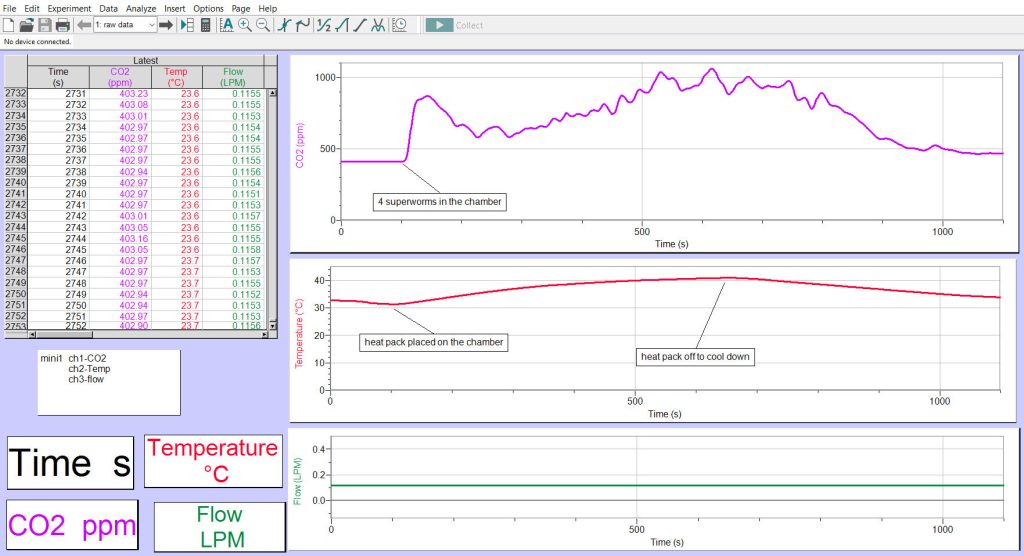
Q-teach packages are extremely flexible. Other sensors and analyzers may be added to the package if required. Qubit can also provide a range of additional sample chambers for insects, small animals and aquatic organisms. Learn more about the Q-teach Animal CO2 package HERE. For more active and larger animals (mammals, birds) consider the Q-teach Animal CO2 and O2 package, which has an NDIR analyzer with a 0 – 3% range. For more information click HERE.
What our clients say:
I’ve been using this equipment for approximately 16 years and feel that the labs I have done with students have proven worthwhile and of enduring value.
Christopher F. Sacchi Chair, Biology Department, Kutztown University of Pennsylvania
Q-teach Plant CO2 Package (from $5600 US)
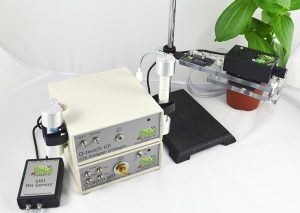
The Q-teach Plant CO2 package includes Qubit’s teaching NDIR CO2 analyzer (0 -2000 ppm range) pump, flow meter, variable LED light source, relative humidity sensor and leaf chamber to investigate photosynthesis, evapotranspiration, and (photo)respiration in plants. Refillable gas bags provide a stable source of ambient air, and can be used to mix different levels of CO2. Additional chambers can be provided to monitor root and soil respiration. Example experiments include:
- Measurements of photosynthesis and evapotranspiration at different light intensities.
- Measurements of CO2 dependence of photosynthesis.
- Physiological comparisons of sun and shade plants.
- Physiological comparisons of C3 and C4 plants.
- Temperature effects on root and soil respiration.
Learn more HERE
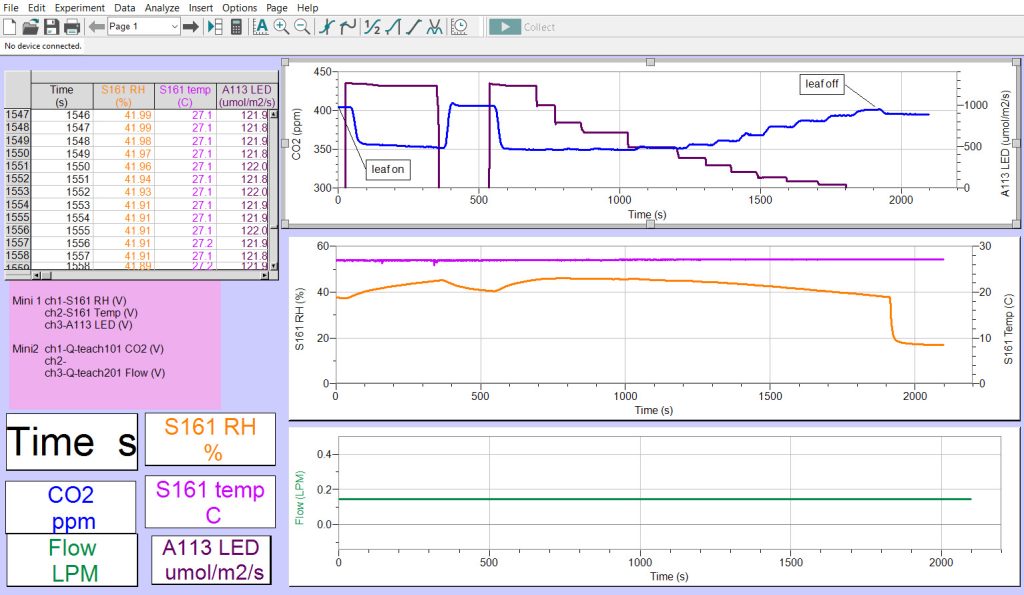
What our clients say:
The quality of their systems is equally matched by the service that they provide. They offer a personal, friendly touch to service that is not often found in companies today. I almost feel as though they are family. Qubit offers the absolute best service and support of any company that I have encountered in my 27 years of teaching.
Dr. Janice M. Coons, Professor of Botany, Biological Sciences Department, Eastern Illinois University, Charleston, IL
Other Low-Cost Equipment for Teaching and Research
Q-Box AQUA (from $6700 US)
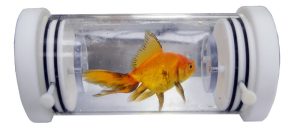
The Q-Box Aqua is used to measure metabolic O2 consumption by intermittent-flow respirometry in which measurements are made sequentially without removing the fish (or other aquatic organism) from the chamber. The chamber is flushed with fresh water between measurements. Dissolved oxygen data corrected for salinity, temperature and pressure are displayed in software and used to calculate VO2. All of the components of the Q-Box AQUA Package are housed in a rugged weather proof case for easy transport and storage. Learn MORE.
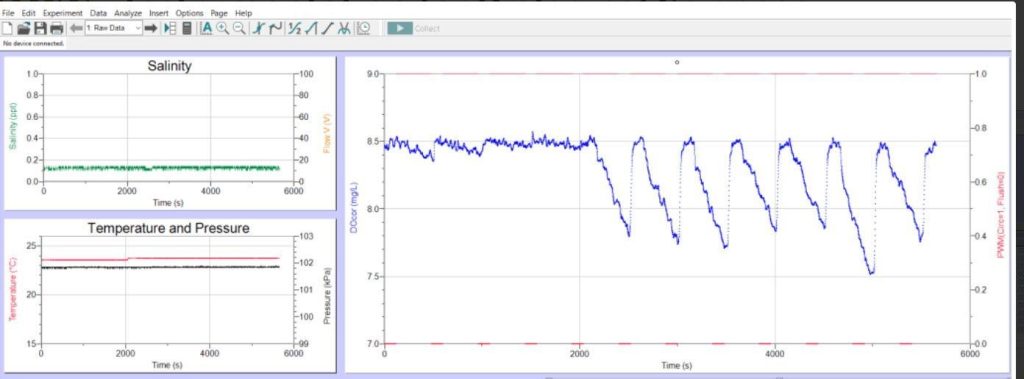
Mini-AQUA for Small Samples
For aquatic respirometry measurements of small fish and insect larvae (~1g) Qubit offers the Mini-AQUA package, a modified version of the Q-Box AQUA with a smaller aquatic respirometer chamber (9mL) and components resulting in a system with a smaller total volume. The mini-AQUA package also features a micro-chamber (1.23mL in volume), with a DO probe inserted in the top portion, for measurements of VO2 with very small samples such as larvae and juvenile fish of less than 0.5g. The micro-chamber is used in the intermittent stop-flow mode, resulting in very high sensitivity and resolution.
References
- Osterheld K et al. (2023) Triploidy in Mytilus edulis impacts the mechanical properties of byssal threads. Aquaculture 566: https://doi.org/10.1016/j.aquaculture.2022.739191
- Lucey NM, Collins M, Collin R (2022) Physiological, biochemical and genetic responses of black tiger shrimp (Penaeus monodon) to differential exposure to white spot syndrome virus and Vibrio parahaemolyticus. Aquaculture 546: https://doi.org/10.1016/j.aquaculture.2021.737337
OX1LP Dissolved Oxygen Packages (from $4220 US)
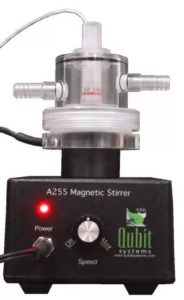
Qubit’s OX1LP Dissolved Oxygen Packages incorporate a polarographic dissolved oxygen electrode to measure photosynthesis and/or respiration in the aqueous phase using suspensions of plant or animal cells, organelles (chloroplasts and mitochondria), invertebrates or algae. These packages may also be used to monitor chemical and biochemical reactions that either produce or consume O2 in the aqueous phase. Interchangeable water-jacketed cuvettes with volumes of 1.0, 2.5, 4.0, 6.0, 30 and 50 mL may be supplied with the system. Each uses the same O2 electrode base and stirrer. Learn MORE
References
- Nair P et al (2023) Temperature responses vary between riffle beetles from contrasting aquatic environments. Journal of Thermal Biology 112: https://doi.org/10.1016/j.jtherbio.2023.103485
- Nair P, Huertas M, Nowlin WH (2023) A broad-spectrum synthetic antibiotic that does not evoke bacterial resistance. eBioMedicine 89: DOI: https://doi.org/10.1016/j.ebiom.2023.104461
Click HERE to learn about all of Qubit’s Aquatic Biology and Aquatic Control Systems
Upcoming Conferences and Exhibitions
Please visit the Qubit exhibit at our upcoming conferences to learn more about Qubit’s instrumentation.
American College of Sports Medicine
Boston, Massachusetts May 28-31 2024
Society for Experiment Biology
Prague, Czechia July 2 – 5 2024
Honolulu Hawaii, June 22-26 2024
